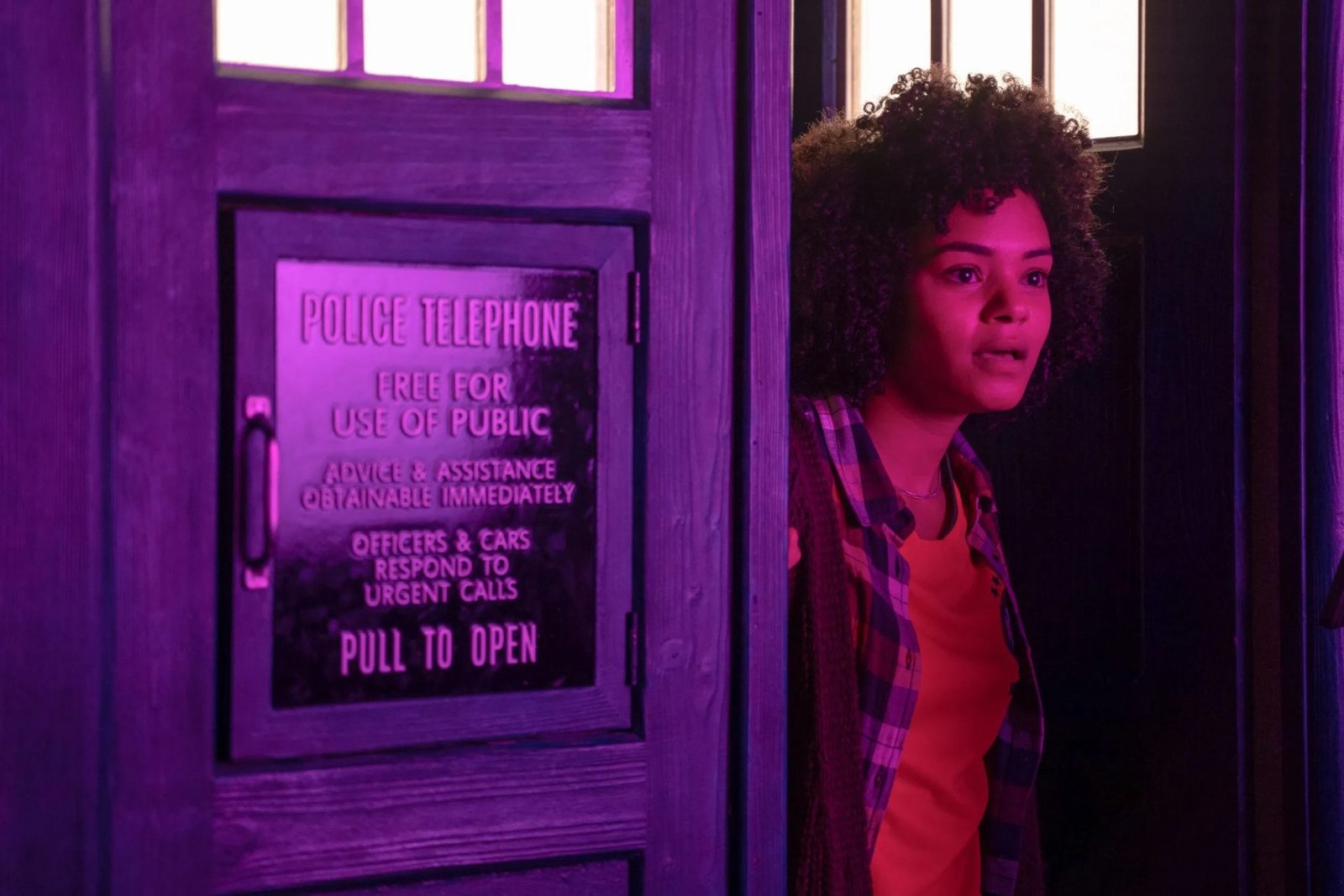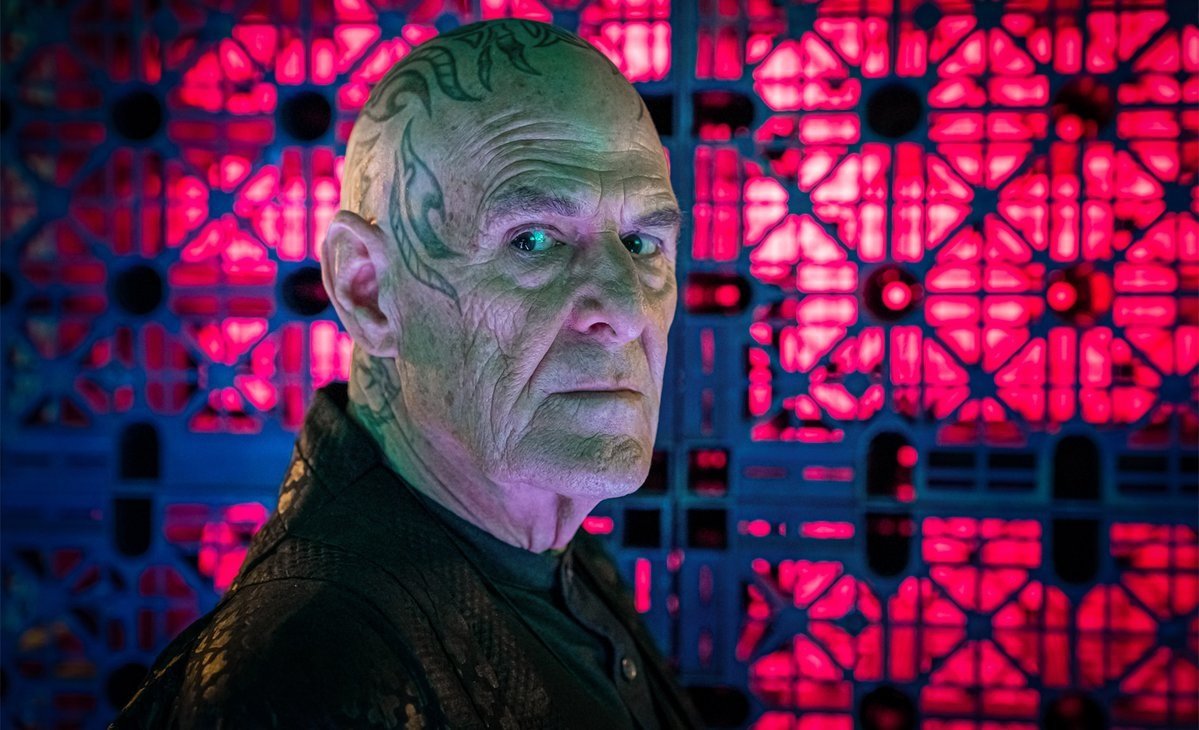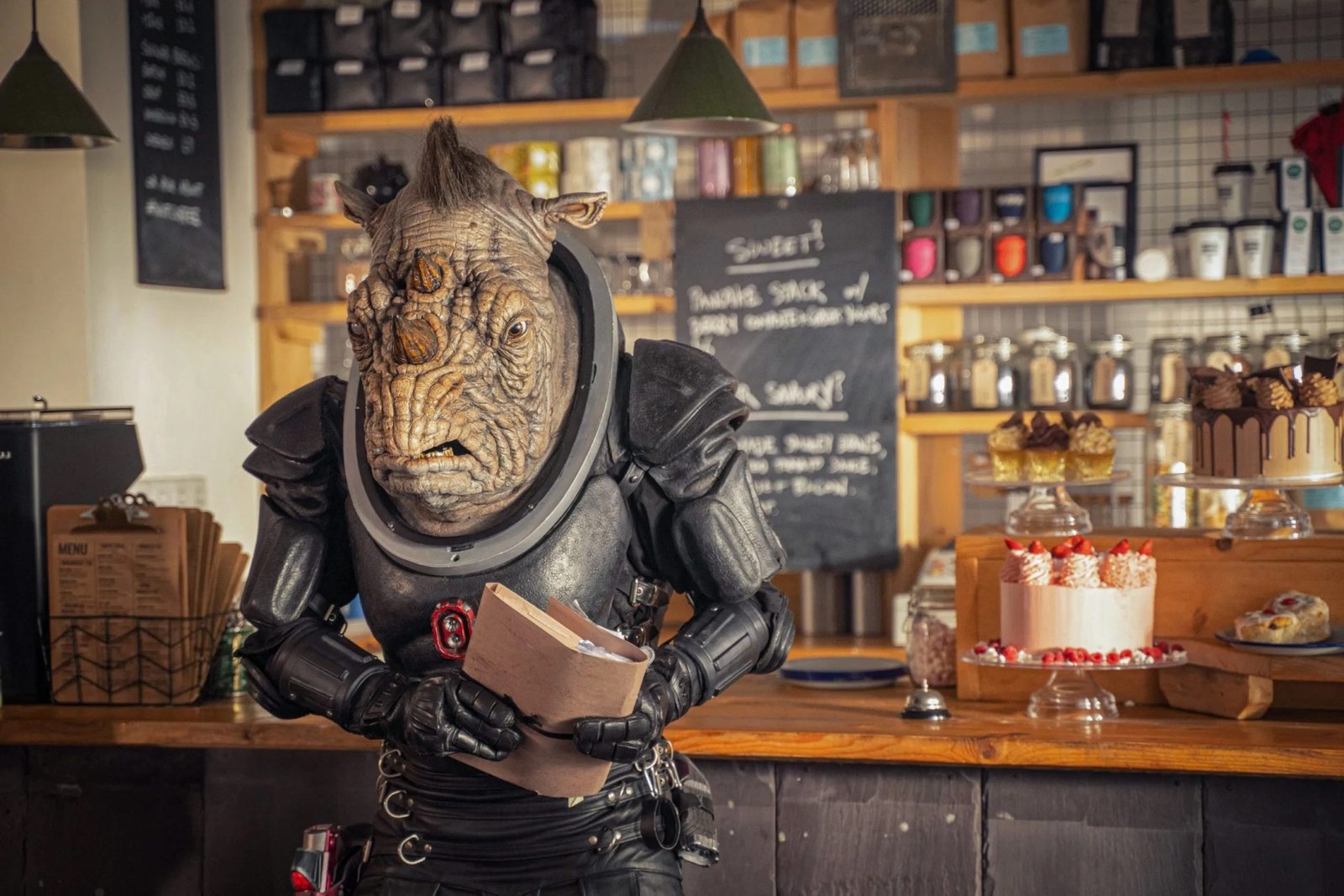Have you heard? Plastic’s really bad. They’ve kept this fact quiet for so long, it feels like such a weight off my shoulders to finally reveal the truth: plastic is bad for you and me and the environment. And so, without a “won’t somebody please think of the children?!”, Praxeus recycled the theme of Orphan 55 from a few weeks, and showed us how we’re destroying our planet.
In his review, Rick Lundeen was less than enamoured about how the Thirteenth Doctor reacted the situation:
“Yaz gets all independent and does some blind teleporting and just some dangerous, stupid things in general, yet, when she tells the Doctor, the Doctor doesn’t get mad and when they finally come get her… okay, show of hands: under these circumstances, would the Doctor hug the companion upon rescue? Show some concern? Most past indications would say yes. But of course not here, because the Doctor has no connection to the companions. What the Doctor does have is a wonderful opportunity to lecture us again about pollution. Evidently, as far as worlds who have just behaved abominably in this respect, Earth is the only planet in several galaxies to do that. Zowie! I’m actually surprised she didn’t recap for the class at the end during the narration.”
What did the rest of the DWC think? We surrounded DWC Plaza with a swarming murder of crows so none could escape! Sadly, some did, but we caught up with enough contributors to get a decent enough sample of opinions…
Colin Burden

I alluded to this in recent comments, but if the BBC are going down the eco-warrior route then this would be the perfect time to revive Doomwatch (let’s forget that Channel 5 killed Quist, in their 1999 version).
It would be the perfect opportunity to make as many ecological statements as they like: plastic pollution, air-pollution, chemical waste, climate change, fly-tipping, the effects of wi-fi waves… the list goes on. With the current climate (no pun intended), it can be as preachy as it likes (well, within reason) as the eco message would be its reason to exist.
Doctor Who, at this time, has become Doomwatch-Lite. We’ve had climate change and now we’ve got plastic waste pollution. Thankfully in this instance, it wasn’t as laboured a point as Orphan 55 was.
The trouble was – and this may be unfair of me – Praxeus was already wounded by the magnitude of its previous episode, Fugitive of the Judoon. Despite that, Praxeus had a lot of promise: Warren Brown could have been a new Duggan; the out of control re-entry was a great set-piece; the virus death scenes were gloriously macabre; and the bird attack on the laboratory was a nice pastiche on Hitchcock. It was just missing that emotion that has held back many of these episodes: people died and no one really cared.
Tony Jones
I enjoyed Praxeus for several reasons. It may not be an instant classic, and we had a rest from mind-bending revelations, but it filled the time with a well-paced adventure that worked well. I kept being reminded of Orphan 55, not just because of the ecology message but also the large cast of apparently random characters. Here they came together to produce a single story (unlike Orphan 55), the plastics in the food-chain message was hammered home around a credible story, and the companions had things to do! I even thought Yaz might even be taking one risk too many and this could be her final outing.
I also found the Praxeus disease rather horrible to watch and full marks to the effects and make-up. There are a good few holes in the plot if you look for them but for me this entertained and also let Warren Brown deliver another sold performance from non-TARDIS crew characters.
Simon Danes

I know. Why don’t we just make a quick comparison between the two episode 6s of the two series 12s of Doctor Who? Maybe it will tell us something.
Year: 1975/ 2020
Title: The Ark in Space part 2/ Praxeus
Doctor: Tom Baker/ Jodie Whittaker
Companions: Sarah and Harry/ Ryan, Yaz and Graham
Writer: Robert Holmes*/ Chris Chibnall** and Pete McTighe
Villains: The Wirrn/ Naughty people who use stuff made from plastic
Genre: Horror and science fiction/ CBBC does science fiction
Overnights: Over 13 million/ Under 4 million
*Robert Holmes also wrote Spearhead from Space, Terror of the Autons, Carnival of Monsters, The Deadly Assassin, and The Caves of Androzani.
**Chris Chibnall also wrote The Tsuranga Conundrum and Cyberwoman.
Not much more to say, really.
Depressing, isn’t it?
Paul Cheesman
First good point: most of the companions had a small role to play. First bad point: they overplayed them. Second good point: there was a sort of storyline. Second bad point: I did not really think it made sense. I liked the idea of a disease that turned people to stone… although, of course, in old nu-Who that was not cured until the year 5,000,000,023 on New Earth!

The couple were a bit of an embarrassment – “I’m sorry I wasn’t at the launch” – hardly old enough to be ‘viscous’, yet in reality seemingly indifferent to each other. The saving of the husband at the end was nice but the whole idea of his self-sacrifice was unrealistic… “Adam Lang, your job is so easy!” This is where Captain Jack should have cameoed.
The rest of story was flimsy – the only thing that I felt was good was the timing (coronavirus and all that) but that was hardly a BBC decision.
Final Verdict – episode six – the story was a bit boring… and to think it had two scriptwriters!
Leon Hewitt
Maybe it’s because BBC4 is currently repeating This Life, or maybe it was the documentary I caught about the pop anthem Common People, but I’ve had the 1990s on my mind a fair bit recently. Or maybe it was this week’s Doctor Who, which from the opening scenes brought back happy memories of Virgin’s New Adventure line of Doctor Who novels.
Throughout the 1990s when the programme was off-air, the Doctor’s adventures were continued in a range of novels featuring ‘stories too broad and deep for the small screen’. Often these books would begin with the Doctor and companions already embedded in the adventure. The line the Doctor utters early on this week, “I’ve sent them all on errands” describes perfectly the Time Lord’s modus operandi in these books.
Out of all of the 61 novels published, Praxeus reminded me a most of former script editor Andrew Cartmel’s War trilogy (Warhead, Warlock and Warchild). Set in the near future and exploring popular cultural and political themes of the time, these books placed the Doctor very much in the background of the story – it was the companions and supporting characters that drove the plot. It was the same here. The Doctor sends her companions on individual missions – she behaves like a military tactician, coordinating the disparate threads before bringing them all together to solve the mystery and save the day. This was a refreshing change for the Thirteenth Doctor. Gone was the patronising school teacher we’ve been used to; now she was treating her companions with respect – allowing them to play vital roles in the adventure.

I’m not sure I want Doctor Who to be a near-future eco-thriller every week, but as a one-off, this was a nice change. This was the strongest episode of the programme for a while. The various elements came together well and there was a quiet confidence for much of its duration. Praxeus demonstrated, thanks to the flexibility of the format, that there may be life in the old show yet.
James Baldock
I’m going to level with you: I spent certain key moments of Praxeus hiding my face in my hands. It’s nothing to do with virtue signalling. It’s simply because the type of death depicted this week – the scaling of the body, from fingertips to skull, followed by sudden facial disintegration – is something I’ve never been able to watch, and thus something I’ll avoid watching as much as possible. You remember that scene in Resident Evil where the guy gets sliced into cubes by the lasers? I don’t.
It’s an exercise in empathy, this cowering behind the fingers, because my 10-year-old was similarly freaked. And I suppose this was an episode for him, in a way, given the message it was conveying, delivered with the same sense of understated reserve we’ve come to expect from Chibnall’s time on Doctor Who. It isn’t enough simply to show the effects our disposable culture is having on the oceans; we have to get a hastily delivered lecture as well, Whittaker pacing and gesticulating with the ferocity of a BSL interpreter during a Stormzy gig, pausing to dip her head and lower her register during the important bits. Regular readers at the DWC will know that I was one of the few champions of Series 11, and I stand by everything I said in 2018, but even I’m finding this a bit much.
That’s a shame, really, because the more this run of episodes continues the more Jodie seems to be hitting her stride. She really is very good this week: confident and calm, pulling off precise TARDIS manoeuvres without breaking a sweat and appearing, it seems, in all corners of the world at a moment’s notice with the sort of omnipresence that Jennifer Saunders’ character managed in Muppet Treasure Island. Indeed, Praxeus is one tribute act after another, paying homage both to The Birds and Hot Fuzz almost within the same minute. There’s a glossiness to the episode; an elegant, packaged feel: who cares if the scenery is largely recycled when it looks this good?

But as good as it is – and there is much to enjoy this week, from Graham’s heartfelt, beautifully photographed beach conversation with Jake to the happy ending we arguably didn’t deserve – it’s very much Been There, Done That. The timing doesn’t help (we’re only three weeks after Orphan 55, remember) but it’s hard not to shake the feeling that someone high up at the BBC is sending down notes, mostly along the lines of “Needs a monologue”. Would it hurt to simply mention things and then drop an advisory message at the end of the programme so that people can look things up on the internet? Because we’ve got 490 minutes a year, which really isn’t much in the grand scheme of things, and I’d really not be wasting any more of them listening to another lecture about how plastic is killing the environment. Not when the BBC have just greenlit another line of action figures.
Oh, and just as an afterthought: somewhere, millions of years ago on prehistoric Earth, a charred and bloodstained young maths prodigy is crawling out of a wrecked spacecraft. And he’s really, really p*ssed off.
Andrew Hsieh
Unlike last week’s arc-driven epic, which ended on a cliffhanger-of-sorts, Praxeus was surprisingly good in a number of ways but certainly not without flaws. Considering that it was another Series 12 episode to be co-written by Chris Chibnall, I had hoped for at least a reference to the story arc, beforehand, but sadly didn’t turn out to be the case.
In contrast to Orphan 55, which specifically tackled upon climate change and its hypothetical consequences, I’m glad they went for a different but unique approach this time round. I didn’t, however, expect the virus concept to unintentionally share some similarities with the Wuhan coronavirus outbreak, considering that Hong Kong (my ethnic country of origin) was also featured as a key location. Even though it’s just a coincidence, with further news updates still coming in, I am of course concerned but not embarrassed by the outcome.

I know there have been a number of LGBT references and controversies since (before) Series 11, but the way how they represented Jake and Adam’s relationship was a significant improvement. Not just the kiss near the end, their dialogue exchanges were predominantly subtle instead of explicitly overemphasising the themes; a sharp contrast to when Captain Jack kissed Graham, but that’s no big deal.
And also, I loved the brief mention of the Autons – by name. Despite their hypothetical link with the virus turning out to a red herring, which I quickly figured out before the Doctor referenced them, perhaps this was all inspired by RTD’s novelisation of Rose?
The main thing I found disappointing, however, was the revelation of Suki Cheng (feel sorry for her, though). Very similar to poor Charlie Duffy, from Kerblam!, who also ended up as reluctant villain before getting killed, it just ended up being recycled in Pete McTighe’s second script. That’s a common problem when writing the climax; sometimes a very similar idea can instantly pop into your head without realising that you’ve used it previously.
A mixed episode, it seems: more positive than, say, Orphan 55, but more negative than Fugitive of the Judoon.
NEXT: You’ll have to speak up; I’m wearing a towel.


